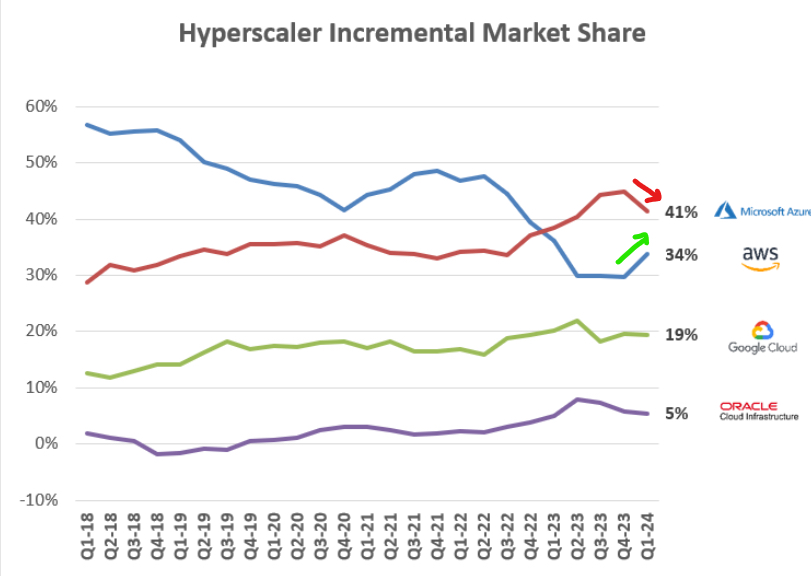
Happy Sunday! The NBA is rumored to be getting $76 billion for its streaming rights—three times its previous deal. Meanwhile, our streaming and cable bills have already gone up 5x. The math ain’t mathing. Reply with the team you’re cheering for.
Now, on to everything we published this week, along with our take on the latest tech and business news.
Was this newsletter forwarded to you? Sign up to get it in your inbox.
Our stories
"I Spent 24 Hours With GitHub Copilot Workspace" by Dan Shipper/Chain of Thought: The promise of Copilot Workspace—GitHub’s AI programming tool—is that you describe what you want to build and then watch as it writes the code for you. Dan put it to the test and found that while it's not perfect, it's a big step toward the future of programming. Read this to learn what kinds of tasks it excels at and where it still needs improvement.
🎧 "Is Prompting the Future of Coding?" by Dan Shipper/Chain of Thought: Step aside, Python. There's a new programming language in town, and it's called English. In this episode of How Do You Use ChatGPT?, Dan chats with Nick Dobos, creator of the popular coding assistant Grimoire, about how prompting is emerging as the new way to do programming. Watch to learn how you can go from idea to live website in minutes using AI. 🔏 Paid subscribers have access to the episode transcript.
🔏 "The AI Wars Have Begun" by Evan Armstrong/Napkin Math: $120 billion was invested into AI last year. Whether this is a colossal waste or a genius move rests on one question: Are AI models valuable products or just commodity components? Meta's latest release—the open-sourced Llama 3—suggests the latter, potentially turning the billions poured into closed-source models into dust. Read this to understand the implications of the AI arms race.
"The AI Hardware Dilemma" by Evan Armstrong/Napkin Math: The iPhone is so good that it's killing the AI hardware revolution. New devices from Humane and Rabbit have flopped because they can't compete with the iPhone's superior sensors, silicon, and interface. But there's still hope for startups: Go weird. Very, very weird. Read this if you want to understand the challenges and opportunities in the AI hardware space.
"You Are the Technical Cofounder You Need" by Nir Zicherman: There has never, in the history of nerdhood, been an easier time to learn to code. So the non-technical entrepreneur should become a thing of the past. Nir Zicherman, the technical co-founder of podcasting startup Anchor, makes a compelling case that in the age of AI, anyone can become their own technical co-founder—all it takes is the motivation to learn. Read this if you have a great startup idea but have been holding back because you lack an engineering background.
Chain of links
Elon’s X.AI is trying to raise $6 billion. Love him or hate him, the man has a gift for separating investors from their capital. His latest, a Walmart-brand version of OpenAI, is raising $6 billion at an $18 billion pre-money valuation (so $24 billion all in) despite being only 10 months old.
ChatGPT got some memory. Providing context for your prompt to an LLM is one of the trickiest problems to solve in AI. OpenAI made progress on that front by releasing memory features, which enable it to remember information across multiple chat instances. Baby steps!
A Llama got fixed. While Zuck’s software was good, the Meta LLM’s glaring weakness upon release was its 8K context window, compared to the 1 million of its closed-source peers. A few short weeks later, an open-source alternative with a 1 million token context window was released. That’s that magic of open-source, baby!
Coreweave got a fat multiple. The company, which specializes in running GPUs workloads in the cloud, raised $1 billion at a $19 billion valuation, up from $7 billion six months ago. In today’s venture capital markets, it is either feast or famine, and AI leaders are eating up.
OpenAI do be getting sued a lot. Joining the New York Times, eight newspaper chains owned by Alden (the U.S.'s second largest newspaper operator) sued OpenAI over training its models using copyrighted materials. The bigger, more interesting question is whether copyright should even exist, but seeing as OpenAI has been signing media licensing deals lately, this is more likely a shakedown. —Evan Armstrong
The napkin math
Peloton has gone from rags to riches to rags. The (as of this week’s earnings) recently fired CEO tried to pivot the connected-fitness company beyond hardware sales to an asset-light model where customers would subscribe to its app for fitness content. It really, really didn’t work. The company is down from a $50 billion market cap to $1.15 billion and has laid off another 15 percent of staff. Brutal.
Apple politely bribed its shareholders. The company’s sales numbers were middling, with iPhone sales down 10 percent and Mac sales up 4 percent (services, up 14 percent, were a bright spot). But since it canceled the Apple Car and is underinvesting in the Vision Pro, there is no real hardware growth story for the company. You can view its $110 billion in share buybacks as either a management team confident in their long-term growth or CYA while they figure out how to make this thing bigger.
Autonomous vehicles aren’t dead yet. With most of the attention (rightly) focused on Waymo, Tesla, and Cruise, Hyundai came out of nowhere with an almost $1 billion investment in autonomous startup Motional. I am bullish on the sector and think Hyundai is making the right move.
Homepages are cool again. The Verge’s loyal users increased 47 percent in 2023 when it deployed a homepage redesign that emphasized making the tech site a destination. With social media no longer sending traffic off platform, media companies are stuck doing the uncomfortable task of making something people want. Yuck!
Entertaining content isn’t addictive enough. LinkedIn became the latest web 2.0 giant to offer games. Everyone from Netflix to the New York Times view gaming as a significant avenue for retention and growth, and have incorporated it into their core product. Not to be an old man shaking his fist at the sky, but this is depressing. Attention competition dynamics are so strong that the universal desire for minigames is a sad state of the world. —EA
For the love of charts
Don’t call it an AWS comeback. The latest earnings data suggests that Amazon AWS is fighting back against Microsoft Azure’s cloud encroachment. It takes a little guesswork to tease these numbers out from public data, but after losing “incremental share” (i.e., share of net new revenue) to Azure for nearly two years, AWS appears to be gaining again—at Azure’s expense:
Source: Altimeter Capital.AWS jumped from 30 percent of “incremental share” to 34 percent, while Azure slipped from 45 percent to 41 percent. That AWS would increase its share is a slight narrative violation, since Microsoft is supposed to be the new King of the (AI) Cloud. Obviously this battle royale is far from over, but being the developer’s choice (Amazon) may have more distributional advantages than having friends in the C-suite (Microsoft)—that, plus investing three times more in your platform over the last couple of years. —Moses Sternstein
The examined life
You are what you build: In one of my favorite books, Seeds of Contemplation, 20th-century monk Thomas Merton wrote, "Many poets are not poets for the same reason that many religious men are not saints: they never succeed in being themselves." This sentiment doesn’t just apply to saints or religious people—what we produce is a direct reflection of who we are. To create something truly meaningful, eschew blind imitation, embrace your true nature, and let it shine through your work. It might just be the best you’ve ever produced. —Ash Sharma
You are also what you critique: I lived in New Zealand for two years and make a point of going back as often as I can, so I took note of this hilarious interview between a publishing journalist and a clueless bureaucrat who was put in charge of the country’s art budget while knowing absolutely nothing about art. Everyone thinks they know best until forced to confront an expert. —EA
More great reads
We’ve partnered with Bessemer Venture Partners to share some tactical resources for founders:
- From Startup to Centaur: The Founder's Roadmap to $100M ARR: Bessemer arms CEOs with the insights they need as they build, scale, and lead the next generation of tech giants. Get your copy of the book.
- AI Escape Velocity: A Conversation with Ray Kurzweil: Futurist Dr. Ray Kurzweil discusses why the future is only getting better, where the AI economy is headed, human relationships with AIs, longevity escape velocity, and so much more.
Master your attention with tactical mindfulness
Early bird pricing for The Hidden Discipline, an eight-week mindfulness course taught by founder-coach and Every columnist Casey Rosengren, has been extended until Monday. Every subscribers can save 30 percent and enroll now for just $699. Through live sessions, daily practice, and expert guidance, you'll gain the tools to power through challenges, handle stress with ease, fully savor life's best moments, and be more present and effective in every area of your life.
Eye candy
What if we kept our iCloud at home?
Source: X/Lucas Crespo.That’s all for this week! Thanks for reading, and be sure to follow Every on X at @every and on LinkedIn.
The Only Subscription
You Need to
Stay at the
Edge of AI
The essential toolkit for those shaping the future
"This might be the best value you
can get from an AI subscription."
- Jay S.
Join 100,000+ leaders, builders, and innovators

Email address
Already have an account? Sign in
What is included in a subscription?
Daily insights from AI pioneers + early access to powerful AI tools








Comments
Don't have an account? Sign up!
Been fire from Every lately